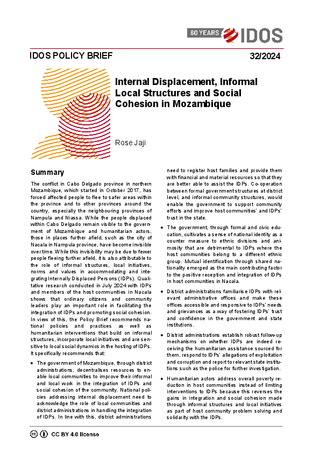Internal displacement, informal local structures and social cohesion in Mozambique
Jaji, RosePolicy Brief (32/2024)
Bonn: German Institute of Development and Sustainability (IDOS)
DOI: https://doi.org/10.23661/ipb32.2024
The conflict in Cabo Delgado province in northern Mozambique, which started in October 2017, has forced affected people to flee to safer areas within the province and to other provinces around the country, especially the neighbouring provinces of Nampula and Niassa. While the people displaced within Cabo Delgado remain visible to the government of Mozambique and humanitarian actors, those in places further afield, such as the city of Nacala in Nampula province, have become invisible over time. While this invisibility may be due to fewer people fleeing further afield, it is also attributable to the role of informal structures, local initiatives, norms and values in accommodating and integrating Internally Displaced Persons (IDPs). Qualitative research conducted in July 2024 with IDPs and members of the host communities in Nacala shows that ordinary citizens and community leaders play an important role in facilitating the integration of IDPs and promoting social cohesion. In view of this, the Policy Brief recommends national policies and practices as well as humanitarian interventions that build on informal structures, incorporate local initiatives and are sensitive to local social dynamics in the hosting of IDPs. It specifically recommends that:
• The government of Mozambique, through district administrations, decentralises resources to enable local communities to improve their informal and local work in the integration of IDPs and social cohesion of the community. National policies addressing internal displacement need to acknowledge the role of local communities and district administrations in handling the integration of IDPs. In line with this, district administrations need to register host families and provide them with financial and material resources so that they are better able to assist the IDPs. Co-operation between formal government structures at district level, and informal community structures, would enable the government to support community efforts and improve host communities’ and IDPs’ trust in the state.
• The government, through formal and civic education, cultivates a sense of national identity as a counter measure to ethnic divisions and animosity that are detrimental to IDPs where the host communities belong to a different ethnic group. Mutual identification through shared nationality emerged as the main contributing factor to the positive reception and integration of IDPs in host communities in Nacala.
• District administrations familiarise IDPs with relevant administrative offices and make these offices accessible and responsive to IDPs’ needs and grievances as a way of fostering IDPs’ trust and confidence in the government and state institutions.
• District administrations establish robust follow-up mechanisms on whether IDPs are indeed receiving the humanitarian assistance sourced for them, respond to IDPs’ allegations of exploitation and corruption and report to relevant state institutions such as the police for further investigation.
• Humanitarian actors address overall poverty reduction in host communities instead of limiting interventions to IDPs because this reverses the gains in integration and social cohesion made through informal structures and local initiatives as part of host community problem solving and solidarity with the IDPs.


